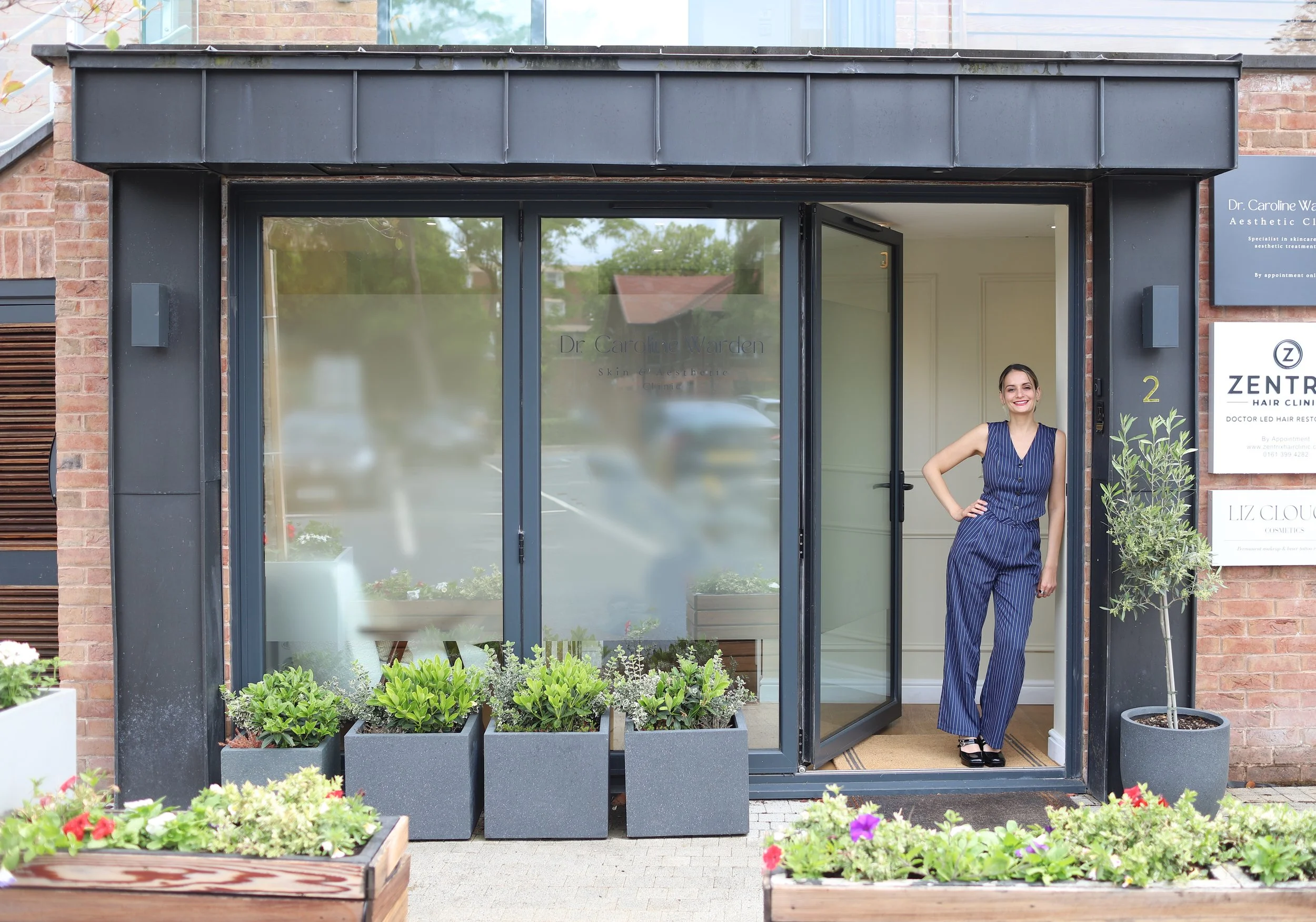The Gut–Skin Axis: Is Your Diet Causing Breakouts?
by Dr Caroline Warden NHS GP, cosmetic dermatology and aesthethic doctor in Hale, Cheshire
Are are using the “right” cleanser, invested in the serums, diligent with SPF and even have a home LED mask (the one recommended by me of course) BUT skin breakouts keep coming?
You’re not alone.
In clinic here in Hale, I meet so many patients who feel frustrated and defeated by their skin. They are doing everything “right” on the outside but what they don’t realise is that the conversation between your gut and your skin can be just as important as what you put on your face.
What am I talking about? This is the gut–skin axis, a fascinating, growing area of research linking your microbiome, hormones, diet, stress, and inflammation. In other words, your skin isn’t just a surface problem. It’s part of your whole system.
The Psychology of Breakouts
Before we dive into science, let’s be honest: skin issues affect more than just our reflection. Acne, rosacea, or dull, inflamed skin can have a huge impact on:
Confidence: You start avoiding photos, mirrors, and even social events.
Stress levels: Stress itself can worsen acne, creating a vicious cycle.
Self-image: We subconsciously link “healthy skin” with health, vitality, and attractiveness, so breakouts can make us feel out of sync with ourselves.
In aesthetics, we see this all the time: treating the skin is rarely just about vanity but it’s about helping people feel comfortable in their own skin.
And sometimes, that means looking deeper than the epidermis…
The Gut–Skin Conversation: What’s Really Happening Inside
Your gut is home to trillions of bacteria, fungi, and other microorganisms, collectively called the microbiome. Think of it as an internal ecosystem that keeps your digestion, hormones, and immune system balanced.
When this ecosystem gets disrupted, through diet, stress, antibiotics, or illness it can trigger inflammation that shows up on your skin.
Here’s what we know:
Diets high in sugar and refined carbs can spike insulin, which boosts oil production and inflammation ie. prime conditions for acne.
Certain dairy products, particularly skimmed milk and whey-based shakes, are linked with more breakouts in some people.
Low fibre intake starves your gut bacteria, which impacts how your immune system behaves, including in the skin.
Stress hormones change your gut permeability and microbiome balance, indirectly driving flare-ups.
Your skin, gut, hormones, and immune system are in constant conversation. The food you eat, the stress you carry, and the microbes in your gut are all players in the same story.
Case Study: Amelia’s Story
Amelia, a 31-year-old patient, came to my Hale clinic after years of battling breakouts and redness. She’d tried everything from topical retinoids to “miracle” products bought from instagram influencers, but nothing stuck.
We talked about her lifestyle and noticed a few patterns:
She relied heavily on white bread
She had frequent bloating and energy dips after eating.
She drank 2–3 lattes daily and snacked on cheese without thinking much of it.
Her skincare was consistent, but her gut health was neglected.
Rather than adding more products, we decided to explore her gut–skin connection.
Switched her to a low-glycaemic, fibre-rich diet to stabilise blood sugar and feed good bacteria.
Added omega-3s via oily fish
Recommended a clinically backed probiotic to restore gut diversity.
Twelve weeks later, Amelia’s skin was 45% clearer, her redness had settled, and most importantly her confidence had lifted. We didn’t abandon medical skincare; we simply added gut-focused tweaks that allowed everything to work better.
How Diet Shapes Your Skin
You don’t need to become a nutritionist overnight, but understanding a few simple principles can make a huge difference:
1. Balance Your Blood Sugar
Spikes in blood sugar cause spikes in insulin which increases oil production and inflammation.
Tip: Swap white bread, pasta, and pastries for slow-release carbs like oats, quinoa, sweet potato, and lentils.
2. Feed Your Microbiome
Fibre is the fuel your gut microbes thrive on, and when they’re happy, your skin is too.
Tip: Aim for 30+ different plant foods per week: vegetables, fruit, beans, nuts, seeds, herbs.
3. Rethink dairy
Not everyone reacts to dairy, but studies link certain types, especially skimmed milk and whey protein with more breakouts.
Tip: If acne is very stubborn, try a 4–6 week dairy break and track your results.
4. Add Omega-3s
Omega-3 fatty acids help calm inflammation, which can soothe both acne and rosacea.
Tip: Include salmon, sardines, walnuts, flax, or algae-based supplements for plant-based eaters.
5. Support With Probiotics
Certain probiotic strains show promise in reducing inflammation and restoring gut-skin balance.
Tip: Choose evidence-backed probiotics containing Lactobacillus and Bifidobacterium species.
The Gut–Skin–Mind Triangle
Here’s where it gets really interesting: your gut talks to your skin and your brain. It’s a three-way street, which explains why stress often worsens skin conditions.
When you’re stressed, your gut bacteria shift, increasing inflammation.
Cortisol rises, changing how your skin produces oil and repairs itself.
The worse your skin gets, the more stressed you feel—a feedback loop that’s tough to break.
In my Hale clinic, I often combine treatments like chemical peels, LED therapy, or injectables with lifestyle interventions to tackle both the surface and the root cause. When patients feel empowered rather than restricted, their skin outcomes are better.
Your “Diet for Glowing Skin” Blueprint
Here’s a simple, aesthetic-doctor-approved approach to optimise gut and skin health:
| Focus Area | Swap This → | For This | Why It Matters |
|---|---|---|---|
| Carbs | White bread, pastries, crisps | Oats, brown rice, sweet potato | Whole grains release energy more slowly, keeping you fuller for longer. |
| Protein | Whey shakes, processed meats | Lean poultry, tofu, pea protein | Better-quality proteins help muscle repair and support skin health. |
| Fats | Seed oils, processed snacks | Olive oil, avocado, oily fish | Healthy fats reduce inflammation and improve cell repair. |
| Fibre | Low-fibre snacks | Lentils, beans, nuts, berries | Boosts gut health, digestion, and skin vitality. |
| Dairy | Skimmed milk, whey powders | Almond, oat, or soy alternatives | Plant-based swaps can improve skin clarity and reduce sensitivity. |
| Boosters | None | Probiotics + omega-3 | Supports immunity, reduces inflammation, and improves overall wellness. |
When to Get Professional Help
If you’ve tried over-the-counter products and diet tweaks but your skin isn’t improving, it’s worth seeking help. At my clinic, we combine medical skincare with nutritional support for a holistic, evidence-based approach.
Signs it’s time to book a consultation:
Persistent acne despite consistent routines
Rosacea flares worsened by diet or stress
Digestive symptoms alongside breakouts
Feeling overwhelmed by conflicting online advice
5 Key Takeaways
Your gut health and acne are closely linked through hormones, inflammation, and your skin microbiome.
A diet for glowing skin focuses on stable blood sugar, diverse plant foods, omega-3s, and balanced dairy choices.
The gut–skin axis also connects to your mental health, so stress management matters as much as diet.
Personalisation beats one-size-fits-all, what triggers one person’s breakouts might not affect another.
Combining medical treatments with lifestyle strategies often leads to the best results.
Ready to Reset Your Gut to improve skin health?
If you’re struggling with breakouts or rosacea and suspect your gut might be playing a role, I’d love to help. At our doctor-led clinic in Hale, we specialise in combining cutting-edge aesthetic treatments with evidence-based lifestyle changes for real, lasting results.
Book a consultation today
Dr Caroline Warden is an experienced NHS GP and aesthetic doctor. She has been a medical doctor for over 18 years. Her Skin and Aesthetic Clinic is located in Hale, Cheshire
Whether you're new to aesthetic treatments or ready to refine your routine, her bespoke skin assessments are the best place to start. She’ll design a tailored plan based on your skin goals, lifestyle, and timeline.
Book your consultation at the clinic in Hale, Cheshire and experience aesthetic medicine, with a lighter, more personal touch
Our main Hale clinic is local To:
Alderley Edge, Altrincham, Bowdon, Bramhall, Hale Barns, Knutsford, Manchester, Mobberley, Sale, Timperley, Urmston, Wilmslow, Handforth, Poynton, Cheadle, Didsbury, Warrington
Our satellite Disley clinic on Thursday nights at Scott, Skin & Co, is local to:
New Mills, High Lane, Marple, Mellor, Whaley Bridge, Hayfield, Stockport
Recommended Reading & References
A Low-Glycaemic-Load Diet Improves Acne (Randomised Controlled Trial)
Clinical & Histological Benefits of Low-Glycaemic Diets for Acne
FAQs About Gut Health, Acne & Skin Treatments
1. How do I know if my gut health is affecting my skin?
Signs that your gut may be contributing to acne or rosacea include bloating, irregular bowel habits, food sensitivities, and persistent breakouts despite good skincare. Research shows the gut–skin connection is linked to inflammation, hormones, and your skin’s microbiome.
2. Can changing my diet really improve my acne or rosacea?
For many people, yes. Diets that stabilise blood sugar, include more omega-3 fatty acids, and reduce certain dairy products can help reduce inflammation and improve breakouts. However, everyone’s triggers are different, so personalised advice usually works best.
3. When should I seek professional help for my skin?
If you’ve tried over-the-counter products and made diet changes but your skin still isn’t improving, it’s time to book a consultation. We also recommend professional support if:
You have persistent acne despite consistent routines
Your rosacea flares are worsening
You have digestive symptoms alongside breakouts
You feel overwhelmed by conflicting online advice
4. What treatments do you offer for acne and rosacea at your clinic?
At our doctor-led clinic in Hale, we combine medical-grade skincare, evidence-based treatments, and personalised nutritional support. This holistic approach addresses both the skin and its underlying triggers for longer-lasting results.
5. What’s the “gut–skin axis,” and why does it matter?
The gut–skin axis describes the link between your digestive health and your skin. Imbalances in the gut microbiome can increase inflammation, influence hormones, and disrupt your skin barrier. Supporting your gut with the right foods, supplements, and lifestyle choices can make a visible difference to your complexion.
6. Do stress and mental health affect my skin too?
Absolutely. Stress can disrupt your hormones, slow skin healing, and impact your gut microbiome, all of which can worsen acne and rosacea. We take a holistic approach, addressing stress management alongside skincare and nutrition.
7. Do I need a personalised plan, or can I follow a standard “clear skin” diet?
While general tips can help, acne and rosacea triggers are highly individual. What causes one person’s flare-up might not affect another. A personalised plan based on your diet, hormones, gut health, and lifestyle delivers the best long-term results.







